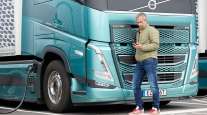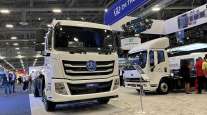Staff Reporter
Thinking About Shifting to Electric Trucks? Start Planning, Panelists Say
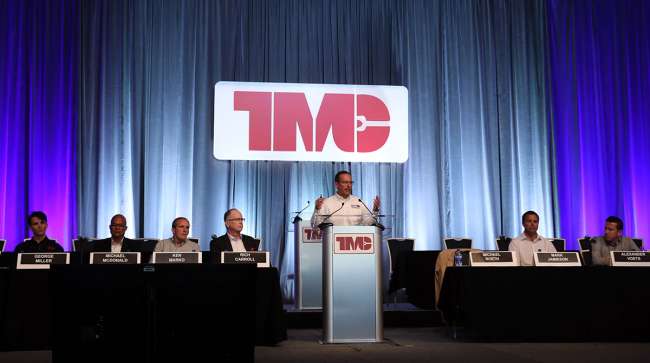
[Stay on top of transportation news: Get TTNews in your inbox.]
CLEVELAND — Fleets looking to incorporate electric trucks into their fleets should plan thoroughly and well in advance, according to experts assembled at the American Trucking Associations’ 2021 Technology & Maintenance Council Fall Meeting & Transportation Technology Exhibition.
Alexander Voets, e-mobility product and sales strategy manager at Daimler Trucks North America, said planning goes beyond the vehicle and extends to charging capabilities within a depot’s infrastructure. Voets spoke Sept. 14 at a technical session held as part of the meeting.
“It’s not only the vehicle that we need to consider,” Voets said. “You really have to think about the entire ecosystem. Charging infrastructure is absolutely necessary if you think about electrifying your fleet.”
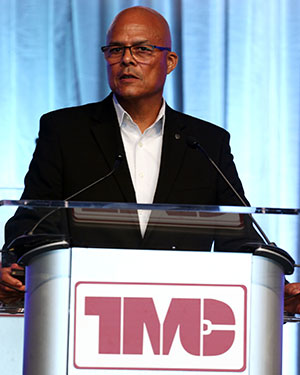
Michael McDonald of UPS Inc. (John Sommers II for Transport Topics)
Michael McDonald, UPS Inc.’s senior director of maintenance and engineering for sustainability and government affairs, said some fleets are planning for electrification two or three years in advance. He pointed out many fleets are housed in older buildings, and running energy into such structures to charge trucks requires planning.
Michael Roeth, executive director of the North American Council for Freight Efficiency, said some people envision electric trucks as having a home only in 70-degree, palm tree-lined environments, but noted these vehicles are in use throughout the country.
“It’s not just California,” Roeth said. “We’ve got electric trucks in Minneapolis and New York.”
Planning for electric trucks also applies to finances, the panelists said. Although electric trucks cost more than their diesel counterparts up front, Voets said electricity tends to be a cheaper source of energy than liquid fuel.
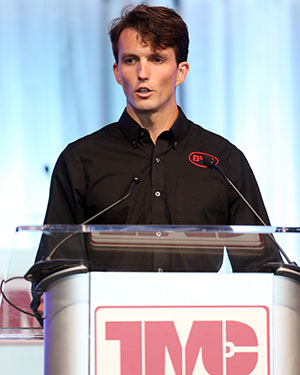
George Miller of BYD (John Sommers II for Transport Topics)
Weight is another important consideration, as batteries are costly and heavy. George Miller, senior sales manager for national fleets at BYD, noted batteries are heavier than diesel chassis, which bears implications on the amount of payload a truck can carry.
“If range is critical to you, you’re going to put more batteries on the system,” said Mark Jamieson, senior director of new business development for electrification at Cummins Inc. “It’s going to reduce your payload, and it’s going to come with a cost penalty.”
For early electric vehicle applications, the speakers indicated certain trucking operations can serve as particularly good starting points. Voets said trucks that follow dedicated and repeatable routes are logical use cases, as they typically can come back to the same location to recharge.
A couple of speakers pointed to terminal tractors and yard trucks as good early applications for electric power. Roeth noted these vehicles demand a relatively low amount of energy and generally operate on flat ground (steep inclines can challenge a battery). He also said a driver’s break is enough time to keep these trucks running.
If range is critical to you, you’re going to put more batteries on the system.
Mark Jamieson, senior director of new business development for electrification at Cummins Inc.
“[If you’re] thinking about regional-haul tractors and also own a bunch of terminal tractors, this is a great place to start,” Roeth said.
The speakers noted drivers’ responses to electric trucks have been positive. Jamieson urged fleets to make sure their drivers understand regenerative braking, which captures energy during deceleration and stores it for later use.
“They like the quietness [and] they like the regenerative braking,” said Kenneth Marko, senior national fleet engineer for Frito-Lay North America Inc. “That’s going to ultimately save for fleets as well.”
Want more news? Listen to today's daily briefing below or go here for more info:



